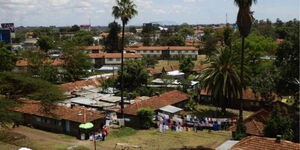Landowners and developers in Kiambu County have been hit with a sweeping overhaul of their land policies affecting all developments.
The county, through a notice in the local daily on Thursday, June 5, published stringent new restrictions under updated spatial planning rules that will govern every application for land development.
The county has declared that no development will be approved unless it aligns with the zoning and spatial framework established in the Integrated Strategic Urban Development Plans (ISUDPs) for 2020–2030.
All applications will also have to meet conditions outlined in the Physical and Land Use Planning Act (PLUPA), 2019, the National Building Code, 2024, and a raft of new development control regulations.
Developers will now be legally bound to preserve agricultural land as part of any subdivision or change of use applications. The rules demand that urban projects on parcels between 20 and 50 acres must retain 20 per cent for urban agriculture, while those above 50 acres must retain 30 per cent.
In peri-urban areas, 40 per cent of land must be preserved for farming, and rural projects must retain a staggering 80 per cent for agriculture. These thresholds, embedded in the county’s zoning blueprint, are intended to curb unplanned sprawl and safeguard food systems.
Failure to comply with these requirements carries serious consequences. The law states, “A person shall not carry out development within a county without a development permission granted by the respective county Executive Committee Member” (PLUPA, Section 57).
Section 58 of the same law warns that “any person who commences any development without obtaining development permission commits an offence and is liable on conviction to a fine not exceeding five hundred thousand shillings or to imprisonment for a term not exceeding two months or both.”
Additionally, Rule 7 of the development control regulations affirms, “A developer shall apply to the planning authority for planning approval in respect of a proposed subdivision or amalgamation.”
According to Governor Kimani Wamatangi, the decision to make the radical changes has been necessitated by the unlawful subdivision of land into uneconomical land sizes and the conversion of rich agricultural land into other competing land uses. “This has led to loss of agricultural land, making Kiambu a food-insecure county and leading to environmental degradation,” he said.
The county has also confirmed that titles registered without a formally approved subdivision scheme will be deemed invalid. The CECM for Land, Housing, and Physical Planning is now empowered to issue stop orders and enforcement notices for any unauthorised projects, as per Rule 9 of the Physical and Land Use Planning (Development Control Enforcement) Regulations, 2021.
Developers must also apply for inspection at each stage of construction, and licensed professionals are required to coordinate joint inspections for compliance before occupancy is granted. Rule 27 mandates, “The licensed professional or duly authorised agent shall, on behalf of the registered owner, notify the County Director requesting a joint final inspection of all relevant authorities.”
As part of the changes, Governor Wamatangi has designated 12 municipalities with new strategic roles under the Integrated Strategic Urban Development Plans (ISUDPs).
Under the new plan, Thika has been declared an industrial hub with smart infrastructure and governance. Juja will become a vibrant knowledge, commercial, industrial and service hub, while Ruiru is to evolve into a well-connected and liveable city with vast investment opportunities. Kiambu Town has been positioned as a principal administrative and preferred hometown for entrepreneurship and trade.
Other towns have been earmarked for specialised roles. Kiambaa is set to become a vibrant commercial, service and residential hub. Kikuyu will shift into a sustainable agro-based industrial and residential hub, and Limuru has been named a globally competitive agro-based industrial hub. Wangige is marked as the preferred choice for trade and residence, with Gatundu becoming a vibrant commercial and service hub.
Kamwangi will serve as an agro-commercial hub, and Githunguri is being developed into a service centre promoting value addition in agricultural products.
Meanwhile, Kimende will take on the role of a functional and administrative town focused on agro-based growth and tourism development.












